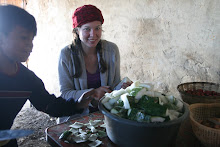Thursday, my four-person group gave a charla on HIV/AIDS to a local high school. I was intimidated. "Now really," our technical trainers said, "you wouldn't really give this charla until you had been living in your community for at least six months, probably a year. It's imperative to built the trust and confidence of the people first, before you go barging in talking directly about genitalia and specific sex acts."
So why are we giving it after only a few weeks, my coworkers and I wondered, but we've long since learned that arguing with the technical trainers is about as fruitlful as trying to argue with one of our host mothers, which is to say, not at all.
We practiced all week, making colorful flip charts, practicing the technical vocabulary and rehearsing skits to show how HIV can be and is transferred to the general public, to faithful housewives and their breastfeeding children. When we arrived at the school, they rearranged their desks on the basketball court to accommodate all eighty students. Girls in plaid, pleated skirts and bright red sweaters, boys with hair full of moco de gorilla (a styling paste that literally translates to "gorilla snot") and one student in a brightly colored indigenous traje stared expectantly at us as angry rain clouds threatened above.
And it went great. Though shy at first, they warmed up as we performed goofy skits, and paid attention through the more boring, technical parts about transmission and prevention.
"Any questions?" We asked at the end. And there were. We took question after question for at least twenty minutes. They asked important questions, intelligent questions, questions that showed they had been paying attention.
When one boy asked, just in general, where condoms are available for purchase and if one brand is better than another, one of the health promoters (our counterparts), stood up from the back. She looked like somebody's grandmother, and in fact, she probably was.
"I would just like to say that all of you kids are way too young to be thinking about sex!" she said. "Right now you just need to study. You shouldn't even think about purchasing condoms!"
A small boy from the second row raised his hand. "I would like to say," he began, "that we just want the information. It doesn't necessarily mean we'll use it, or that we'll use it any time soon. But we aren't bad people, just for asking."
Perhaps I'm reading too much into it, perhaps I'm glorifying our efforts there to the point of ridiculousness. But it seemed to me that beneath the surface of this huffy point/counterpoint was a real generational exchange. I was glad the grandmother stood up. And likewise the young man.
But the most meaningful moment of the day for me happened after we had folded up the flip charts and put away our props. Three girls motioned me over, leaned in close and spoke in sotto voce.
"Is it true that when you lose your virginity, everyone can tell, just by looking at you?"
I did a doubletake.
"No, absolutely not," I said.
"We heard that a woman bleeds on her first time."
"Sometimes that's true, but not for every woman. That's a big lie."
"But isn't there an exam that can be done, to see if a person is still a virgin?"
Whoa! I thought. This deserves more than a firm, monosyllabic "No." I paused for a minute to consider the vocabulary I would need in Spanish to explain the physiology of virginity. Inadequate. I began anyway, and stumbling through it, I felt a real connection with the girls. More importantly, I felt that giving them some good, truthful information about their health and their bodies was making the world a slightly, infinitesimally better place.
Who knows if my Spanish was good enough, or if they even trust the word of a crazy North American woman against that of their mothers and grandmothers. But talking with those three girls was definitely the coolest thing I've done since I've been here, and it gave me hope and peace that I'm doing the right thing.





